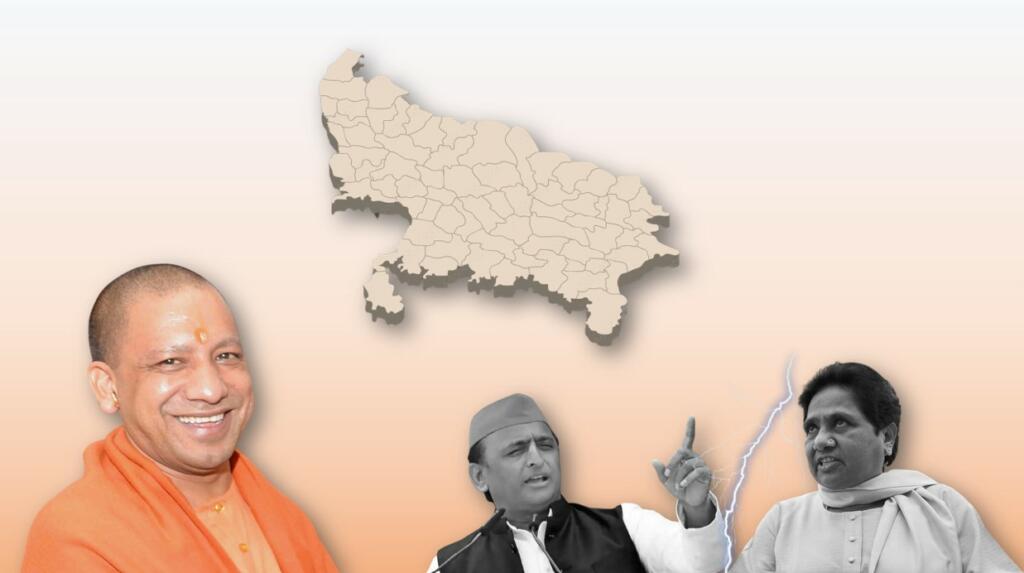The election campaign for the fifth phase of the state assembly elections on 61 assembly seats across 12 districts ended on Friday evening. The voting for the fifth phase of state assembly elections will be held on February 27.
Even now, political analysts are finding it hard to figure out the upcoming results. Though it is yet to be witnessed who will win, a weird strategy of SP and BSP will probably ensure their downfall in the state.
Uttar Pradesh caste politics
We need to understand the UP caste arithmetic first. Reportedly, the state consists of 25-27% general castes (including 10% Brahmins and 7% Thakurs), 39%-40% OBCs (including 7-9% Yadavs and 4% Nishads), around 20% SCs and STs (including 10% Jatavs), and 16-19% Muslim population.
Notably, the percentages known for each caste are not definite as there has been no caste census.
There are five main voting groups in UP — Upper Castes, Muslims, non-Yadav OBCs, Yadavs and Jatavs. Witnessing the earlier records, it can be safe to say that a party can form its government in UP with just 30% vote share by encashing votes of two full groups and bits from the non-Yadav OBCs — SP did so in 2012 with its Muslim-Yadav combination and BSP did it in 2007 with its Muslim-Jatav combination.
Riding on the Narendra Modi wave, BJP went into the UP elections in 2017 aiming at non-Yadav OBCs and non-Jatav SCs. Apart from these communities, its traditional upper-caste vote bank, helped the BJP gain power in Uttar Pradesh in 2017 with a whopping 40% vote share and 312 seats.
SP and BSP against each other
It is pertinent to note that BJP stormed to power in the 2019 Lok Sabha elections with an increment in vote share by 50%. This happened despite an SP-BSP alliance that encashed 38% of votes. However, in the Uttar Pradesh elections 2022, the SP and BSP are contesting separately.
SP is claiming that it will form the government alone with a huge margin in its favour. But it does not look like that as BSP and AIMIM along with Congress will ensure that its votes are cut by a huge margin.
SP is all set to break BSP’s Jatav voter base
In many districts of Western Uttar Pradesh, Muslims are a dominant vote bank. They have historically voted for the Samajwadi Party or the RLD. SP has been wooing its trusted-traditional Muslim vote bank for a long time now and the party has been enjoying the power mainly because of this community.
The Samajwadi Party fielded 78 and 57 Muslim candidates in the 2012 and 2017 Assembly Elections respectively. In 2012, out of 78, 43 were elected whereas in 2017 only 17 candidates got elected from 57 candidates.
In 2012, when the Samajwadi Party formed the government, a total of 69 Muslim nominees were elected to the Uttar Pradesh Assembly. This was the highest number of Muslim MLAs being elected to the UP Assembly since Independence.
Read more: Already hopeless Akhilesh Yadav has only one hope, Muslims
However, Akhilesh Yadav has adopted a ‘secular’ approach this time. The SP has nominated the highest number of candidates from the backward castes nominating them on 171 seats.
The candidate nomination pattern of SC/ST suggests that out of 268 SC/ST candidates, the BJP has nominated 86, SP 89, and BSP 93.
Notably, the highest number of candidates have been nominated from Jatavs (133), out of which the BSP has nominated the highest number (65), followed by the SP (42), and the BJP (26).
With this move, the SP has been trying to break BSP’s core support base which comes from Jatavs by nominating 42 candidates.
BSP’s strategy to cut SP’ Muslim votes
The electoral politics of BSP is assumed to surely harm the Samajwadi party. Mayawati once aligned with SP supremo Akhilesh Yadav, and both were being called ‘bua-babua’ are now political opponents. BSP has fielded candidates in a very spectacular manner, though its electoral gains can’t be predicted.
Read more: Once a kingmaker, now a nobody; the woeful journey of Bahan Mayawati
Upper Caste- 110
Backward caste- 114
SC/ST- 93
Muslims- 86
BSP has fielded the highest number of Muslim candidates, even more than SP, and in many seats, Yadav candidates have been fielded by both parties, which could lead to a split of votes.
SP and BSP’s fight will ensure BJP’s victory
Given the above strategy of giving election tickets, it is evident that both the parties SP and BSP will definitely cut each other’s votes. BJP, however, has not nominated any Muslim candidate. It is a loud and clear message that the party hardly cares about Muslim representation in the legislature.
Read more: What is cooking between Amit Shah and Mayawati?
BJP has fielded candidates in a manner that makes it quite evident that the party is majorly focusing on its traditional upper caste votes and non-Yadav vote bank.
Upper Caste- 143
Backward caste- 173
SC/ST- 86
Muslims- 0
The Samajwadi Party will have to suffer as the Congress party, BSP and AIMIM will cut its Muslim votes as the former party has taken a ‘secular’ approach this time. Moreover, BSP, which was once at the centre of UP Politics, holds no ground.
Thus, the catfight between SP and BSP will take them nowhere but will surely help BJP sweep the state.
